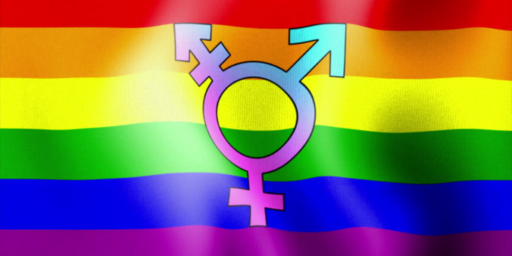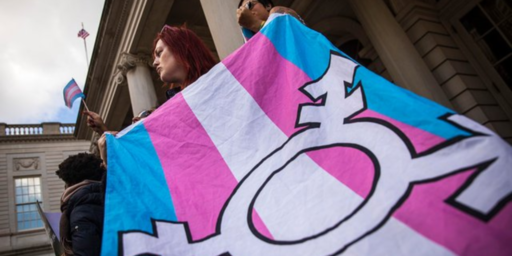Transwomen Banned from Chess Competition
A decision that makes no obvious sense.

NBC News (“World chess body bars trans women from competing in women’s events“):
The international governing body of competitive chess is effectively banning transgender women from competing and stripping trans men of previously won women’s titles.
In its guidelines for transgender competitors released Monday, the International Chess Federation, or FIDE, said players that have transitioned from male to female have “no right” to compete in the game against cisgender women, or those who are not trans, until its officials complete “further analysis” of the issue. The governing body gave itself a timeline of no more than two years to complete its review.
The guidelines also state that women’s titles currently held by trans male competitors “are to be abolished” and can be transferred to a general title of the same or lower level. The federation said if a trans male competitor “changes the gender back to a woman,” the women’s titles can be renewed.
On Thursday, a FIDE spokesperson said in a statement that the “absence of those regulations previously caused ambiguity” when registering trans players to compete. The spokesperson added that FIDE officials need time to study “rapidly developing” legislation on trans issues, “without rushing it.”
“Any further decisions related to admission of the players to official FIDE women events require a more thorough analysis that will be done and further decisions taken by the Council,” the spokesperson said. “Meanwhile, the transgender players are allowed to participate in the open section of the official FIDE chess tournaments.”
I must admit to scratching my head my I saw this news yesterday afternoon. With athletic competition, I get the rationale: we’ve gender-segregated sports because biological males have significant physiological advantages over biological women. That’s literally why “men’s” and “women’s” categories exist in sports. Being only vaguely familiar with competitive chess—I can name maybe three or four historically great players, none of whom are women and only one of whom is non-Russian—I really don’t understand why we gender-segregate.
Not surprisingly, the move is controversial:
LGBTQ advocates have denounced the guidelines, and some critics said the new rules suggest that cisgender men and transgender women are smarter than cisgender women.
“Really? Chess?” the National Center for Transgender Equality wrote Wednesday on X, formerly known as Twitter. “This is so insulting to cis women, to trans women, and to the game itself. It assumes that cis women couldn’t be competitive against cis men — and relies on ignorant anti-trans ideas.”
Yosha Iglesias, a FIDE chess master, professional chess coach and trans woman, criticized the new guidelines on Thursday.
“If you want to help women in chess, fight sexist and sexual violence, give women in chess more visibility and more money,” Iglesias said in a tweet. “Don’t use trans women players as scapegoats. We contribute to the development of women in chess. We are women in chess.”
But the other side have some good points, too. Oh, wait.
Some celebrated the move. In response to a post on X about whether trans women have a “biological advantage” over cisgender women in chess, Jon Schweppe, the policy director of the American Principles Project, a conservative think tank, implied that they do.
“There are more male geniuses than female geniuses,” he said. “There are also more males with low IQs than females with low IQs. This is known. It’s biology.”
There is no recent research that proves men have significantly different IQs or are smarter than women, and older studies — one from 2005 and another from 2006 — that do make that claim have been debunked.
Honestly, even if there were more male geniuses than female geniuses . . . who cares?
The rest of the article talks about the spread of bans of transwomen in women’s sports. But, again, that’s a completely separate issue.
Chess is not like, say, basketball. If we abolished the WBNA tomorrow, approximately zero of the league’s 144 players would be able to make an NBA roster. Indeed, there have been complaints that the league is too small, making it next to impossible for girls to grow up to play at the highest professional level. (By contrast, there are 450 roster spots in the NBA.)
Indeed, a little research shows, men and women usually compete in the same tournaments. It’s just that there are so vastly more men competing in them that the women are anomalies. Separate tournaments are just a way to bring more girls and women to high-level chess.
Getting more female chess players, and better female chess players, requires breaking down the idea that chess is a primarily male game. The United States had never made a concentrated effort on the subject—but it is now.
“It’s a numbers game,” says Maureen Grimaud, chair of the women’s committee at the US Chess Federation. “It’s a total and complete numbers game. What the women’s committee is trying to do is to grow the base.”
[…]
The committee began hosting a girls’ room at national events, a space where female players could connect and realize that they weren’t alone. That, Grimaud says, was key. The biggest bloc of girls at a youth tournament is generally in kindergarten through third grade. As they get older, they start dropping off and become increasingly outnumbered by boys; giving them space to meet and form friendships is crucial. Beyond simply adding more girls, the goal is to make more girls feel comfortable—to build a culture for them to enjoy chess intellectually, competitively, socially.
“They were so excited to see that we had support for them,” Grimaud says. “They know that when they go back home, they might be the only female [chess player] out there for a 200-mile spread.”
There’s also been an increase in girls’ tournaments. The US Chess Federation sanctioned its first girls’ competition in 2003, the Susan Polgar Foundation Girls’ Invitational. The tournament is held annually now, along with several others. And the expansion of girls’ competitions doesn’t stop the country’s most talented female youth from playing in bigger mixed competitions. It simply encourages more girls to want to keep playing.
“It’s supply and demand. If girls and women want to play in them, it means they’re having fun and they’re networking with other girls and they’re using their brains in amazing ways that, in this culture, women sometimes aren’t allowed—the chance to just engross themselves in an intellectual activity,” Shahade says. “I don’t see them as a negative. If girls and women are signing up because they enjoy them, great, and if it starts to get to the point where some girls feel, Well, I’ve won this tournament before, I’m the top girl here, I really want to play in mixed competition with a wider net of people—and that usually does happen to girls, when they get really high ratings—that’s great, too.”
And it seems to be working, albeit slowly:
When Polgar first said that she wanted to be a grandmaster, she was told that it was impossible. “They literally told me that my family was crazy. Did we want to fly next, or go to the moon?” But she was the start of an unprecedented wave. From 1991 to 2000, four women became grandmasters, including Susan and her sister Judit. From 2001 to 2010, 18 women did the same. Since 2011, there have been another 13. With the changes to the Women’s World Championship, there’s hope for even more progress. The growth among girls gives hope, too—not just for individual players, but for the chess establishment to crack the code on women’s success and break down the cultural and financial burdens that once seemed inescapable.
So, to the extent that hosting separate tournaments for girls and women is to grow that side of the game by making them more comfortable, I suppose there’s an argument for trans exclusion if their inclusion substantially lessens the comfort level of biological girls and women. But that doesn’t seem to be what’s motivating the Federation here. And it certainly wouldn’t justify stripping already-awarded titles.






The world series of poker is not segregated. And while no woman has won outright, we have had a few woman reach the last two tables and one reached the final table. When you consider the overwhelming ratio of men to woman this isn’t surprising. So yeah the chess thing is weird.
Transgender Women
Athletes and Elite Sport:
A Scientific Review
Cis men are driving Britain’s anti-trans hostility – the data proves it
@Rick DeMent: Just to clarify, not to justify: Most FIDE events are not segregated. Anyone can compete for the World Championship. Anyone can play in the FIDE World Cup (going on right now). AND, there are specific women’s titles (Women’s World Championship, for instance) and titles: Women’s GM This is done with the intention of encouraging women to play.
The fear is that allowing trans women access to these things will pollute them and drive cis women (some, sadly, might say “real women”) out. I think this is unfounded, and wouldn’t happen, but it’s very typical.
I’ve seen the argument that there’s more genetic variation in males before. It’s based on men having only one X chromosome, so traits that are on X but not on Y have no “averaging” effect, therefore, more variation.
This is applied to intelligence. However, there’s no data that I can find to back it up. I’ve stared at plots of IQ distribution and noted something very odd: There is a slight bulge at the +2 sigma mark in men’s IQ, which disappears at even high variance. I don’t know what that’s about, but it doesn’t support the thesis of “men have more variability in IQ (and chess-playing ability)” which would have the extreme tails highly disproportionately male. In IQ statistics, that doesn’t happen.
Honestly, that’s typical for these things. I do not believe that men and women are identical in all things. However, I think that’s the correct null hypothesis. If you think otherwise, it’s up to you to provide the data that refutes the assumption that they are the same. And “just so” stories don’t cut it, nor do assertions of “this is the way things are, look around”.
I do not believe there is a lot of correlation of I.Q. with chess ability. Top level chess players are able to play many boards simultaneously blindfolded. That is short term memory, not I.Q.
(They also have most of MCO and PCO memorized).
@charontwo:
Orlando airport and Polycystic Ovary syndrome? Pour quoi?
@Stormy Dragon: You beat me to it. The people who are freaked out by trans women in women’s tournaments are not the women they compete against — especially at junior levels, I would expect.
Also, how many trans chess masters are there in the world today? How could the half a percent “drive out” the remaining 99.5%, even at women’s tournaments? Most female chess players will never even meet a trans player in the ordinary course of things.
@Stormy Dragon: Except that it doesn’t actually find that. After numerous caveats that the available studies that are used in the meta study aren’t very good, they say that there’s no advantage except for those that can be explained by height and weight! Oh, “When adjusting for height and fat mass, LBM, CSA, and strength after 12 months of testosterone suppression, trans women still retained statistically higher levels than sedentary cis women. However, this difference is well within the normal distribution of LBM, CSA, and strength for cis women.”
Okay then! No advantage other than all the advantages!
@James Joyner:
Okay fine, we’ll ban trans women from women’s napping competitions, are you happy?
@Jay L Gischer:
To some degree, I suspect this decision is deeply tied to the “International” part of the organization and influence from those in more conservative countries. In particular, I have to wonder about the issue this would be with Russian competitors given the prevailing anti-queer culture there. It’s entirely possible that cis female competitors from those countries would withdraw out of protest.
I’ve been a member of the US chess federation since 1974 and am a life member. Most of my play was of the correspondence variety*. You can see one of my games here. Note it is a PDF.
A couple of observations
I have rarely been interested in chess politics
The number of female players I encountered over the board and in postal can be counted on both hands. With all apologies to Susie Lamn**, Barbara Dorsett, and Sandra Wright.
*- I stopped playing CC in 2009 due to my cancer.
**- Only player I ever played both a OTB and CC tournament game against. Susie and I both frequented the Pompano Beach Chess Club.
@just nutha:
Books of named chess openings – “Modern Chess Openings,” “Principal Chess Openings.”
Commonly used initial sequences of moves to start games.
I will lay $20 that this is 100% political, due to some cowards caving to swine.
@Matt Bernius: Yeah. Russia has a very strong voice in FIDE. (Though FIDE has stepped back from any support of Russia’s Ukraine adventure, as have almost all of the well-known Russian players. One very strong player, Sergey Karjakin, made some very strong public statements in support of the Russian invasion and got himself banned from FIDE events.)
India also has a very strong presence in the chess world these days, and I don’t know at all how they engage with trans people.
I have been told that in Muslim countries such as Iran, trans people are far more accepted than gay people. There is a growing number of good players from these countries (Azerbaijan being the strongest), but arguably the strongest, Alireza Firouja, changed to playing for France on becoming an adult.
Hope spot: the German Chess Federation has put out a “oh yeah? try and make us” announcement and implied the French Chess Federation is about to do the same
Edit: US Chess Federation has made a similar announcement
So they want trans men playing in the Women’s tournament then?
That will be interesting